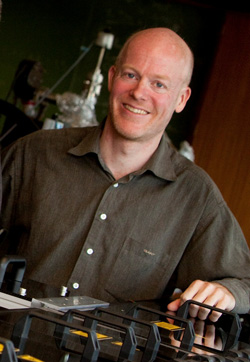Please note, this page has been archived and is no longer being updated.
A Swansea University academic has received a £1.66 million grant from the Engineering and Physical Sciences Research Council (EPSRC) to conduct research that aims to discover more about the fundamental building blocks of the Universe.
 Dr Niels Madsen, Reader in Physics at Swansea University’s College of Science, will use the grant to extend research comparing hydrogen and antihydrogen, in order to discover symmetries between matter and antimatter.
Dr Niels Madsen, Reader in Physics at Swansea University’s College of Science, will use the grant to extend research comparing hydrogen and antihydrogen, in order to discover symmetries between matter and antimatter.
At the moment of big bang, matter and antimatter existed in equal quantities but at the heart of one of the most profound mysteries in our understanding of the Universe is why no bulk antimatter remains in nature today.
Current thinking holds that antimatter should make up half the Universe and that, apart from some characteristics, it is equal and opposite – a perfect mirror image of matter. However, until now scientists have found no evidence of bulk antimatter in the Universe and this is one of nature’s greatest conundrums.
But recently, experiments by the ALPHA (Antihydrogen Laser Physics Apparatus) collaboration at CERN (the European Organisation for Nuclear Research), of which Dr Madsen is a part, have made the creation and capture of a small number of antihydrogen atoms possible.
With the new funding from EPSRC, Dr Madsen is hoping to conduct experiments, that will significantly boost this trapping efficiency, allowing for more antihydrogen atoms to be trapped for longer periods of time and help scientists to discover more about how the Universe was created.
Dr Madsen said: “I am thrilled to get this grant that gives crucial support to our effort to address this fundamental problem in the understanding of the world around us. The UK and ALPHA are leaders in this field, and this funding comes at exactly the right time.”
“I hope my research will contribute to solving the question as to why there’s no antimatter in the Universe. By carefully comparing atoms and anti-atoms over the coming years, we hope to find clues to this mystery and any difference we find will have profound effects on physics as we know it.”
EPSRC’s Head of Physical Sciences, Dr Andrew Bourne said: “The EPSRC investment for Dr Madsen’s work at Swansea University and the ALPHA collaboration will ensure that the UK will continue to explore the fundamental challenge of trapping enough antihydrogen atoms for precision spectroscopy. The centre at Swansea is world renowned for its expertise in this research.”
Group leader Professor Mike Charlton comments, "I am delighted that Dr Madsen has secured this tremendous award for his work. It will help us to keep ahead of the competition in what is a very fast-moving field of study."
- Wednesday 15 May 2013 13.52 BST
- Wednesday 15 May 2013 17.16 BST
- Swansea University
